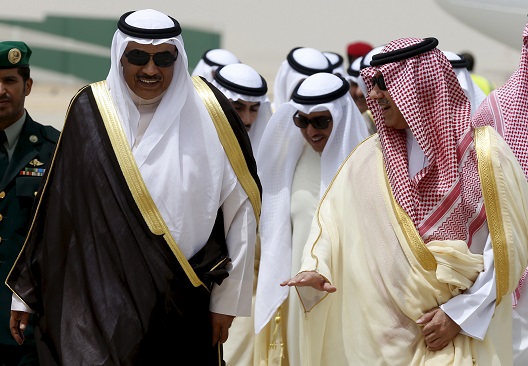 The upcoming Camp David Summit with nervous Gulf Cooperation Council (GCC) leaders has the Obama administration casting about for ways to enhance security assurances. Fearful that a probable nuclear accord with Iran would mark a strategic shift from the Arab Gulf toward Iran as regional guarantor (with the United States then ducking out to pivot to Asia), GCC countries are understandably speculating on a worst-case scenario.
The upcoming Camp David Summit with nervous Gulf Cooperation Council (GCC) leaders has the Obama administration casting about for ways to enhance security assurances. Fearful that a probable nuclear accord with Iran would mark a strategic shift from the Arab Gulf toward Iran as regional guarantor (with the United States then ducking out to pivot to Asia), GCC countries are understandably speculating on a worst-case scenario.
A US abandonment of its largely informal security ties to the GCC, however, is highly unlikely. Even if negotiators reach a nuclear accord with Iran, there is no linkage of an agreement to any wider US-Middle East strategy. In fact, the divorce of the Iran deal from any larger US strategy was one of the major criticisms that former Secretaries of State Henry Kissinger and George Shultz made of the administration in an influential Wall Street Journal commentary.
Nonetheless, given the US role as security guarantor in the Gulf, such fears cannot be wished away. The White House has signaled that it hopes a nuclear accord with Iran would lead to a thaw in US-Iran relations. This fading enmity makes the Gulf’s fears almost inevitable.
It is worth noting that it has not been a case of either/or: until the 1979 Iran revolution, US security policy in the Gulf was based on supporting the “twin pillars” of Iran and Saudi Arabia. The strategic importance of Saudi Arabia and the Gulf states would not disappear with an Iran deal, and remains so, at least as long as the world depends on oil.
A formal alliance, as the US has with NATO or Japan, would require Congressional ratification and remains off the table. But instability in the region and the Gulf’s importance argues for some enhanced security relationship as sought by the GCC states.
There may be some possibilities gleaned from the longstanding US security relationship to Taiwan. While short of an alliance, the 1979 Taiwan Relations Act (TRA) defines the US-Taiwan security relationship. It requires the United States to consider any non-peaceful means to determine Taiwan’s future “a threat” of “grave concern.” It stipulates that in such circumstances, the United States would “provide Taiwan with arms of a defensive nature” and “maintain the capacity of the US to resist any resort to force or other forms coercion” jeopardizing the security of Taiwan.
In addition to the TRA, when the United States normalized relations with China, it gave an informal pledge, known as the “Six Assurances” to Taiwan. These assurances included a US commitment to keep arms sales open-ended, to alter its position on sovereignty over Taiwan, and to not pressure Taipei to enter into negotiations with the People’s Republic of China.
Unlike the NATO Article 5 commitment—that an attack on one NATO member is an attack on all—or the firm commitment to defend Japan if attacked, the TRA did not commit the United States to defend Taiwan. But it did lock the United States into efforts to help Taiwan defend itself, and the “grave concern” language implied possible military action. Most Asia analysts assume that if China took unprovoked military action to unify China, the United States would likely intervene militarily. However, if Taiwan provoked Beijing by formally declaring independence, the United States might not respond.
While the situation concerning the GCC is very different, the Taiwan example may be helpful in crafting stronger assurances to the GCC than are currently the case. Perhaps some Congressional mandate to help the GCC defend itself and a US commitment to view with “grave concern” any outside aggression against a GCC state could help better reassure our strategic partners.
Robert A. Manning is a Senior Fellow with the Brent Scowcroft Center on International Security and its Strategic Foresight Initiative at the Atlantic Council.
Image: Kuwait's Foreign Minister sheikh Sabah al-Khaled al-Sabah (L) arrives to attend a Gulf Cooperation Council (GCC) meeting in Riyadh, Saudi Arabia, April 30, 2015. (Reuters)

